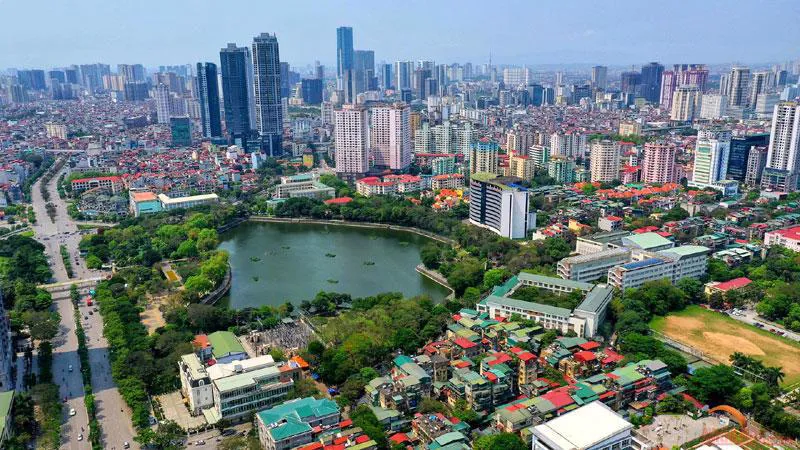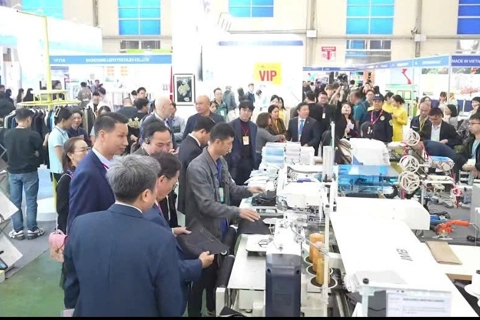Hanoi aims for GRDP growth of 7% in 2024
The city's economy is estimated to have grown by 6% in the first half of this year, up from a 5.97% growth rate in the same period of last year.
Building on strong growth momentum with an estimated GRDP growth of 6% in the first half of this year, Hanoi targets to achieve an economic growth of 6.5-7% for 2024, according to a report by the Hanoi People’s Committee.
| Hanoi from above. Photo: Le Viet/The Hanoi Times |
The report noted amidst intertwined challenges and difficulties, the city has upheld its tradition of solidarity and achieved significant results in socio-economic development. In the first six months of 2024, the city's tax revenue is estimated at VND252 trillion (US$10 billion), or 61.7% of the annual estimate, and up 12.5% year-on-year. Local budget expenditure totaled VND36.4 trillion ($1.4 billion) (24.9% of the annual estimate, up 17.9% year-on-year).
Despite domestic and global economic difficulties, the city's import and export sectors have recovered strongly, with significant growth compared to the same period and the plan. In the first five months of 2024, export turnover reached $7.15 billion (up 7.7%), and import turnover reached $15.97 billion (up 11.5% compared to a 14% decline in the same period last year).
Social investment capital also increased significantly, outpacing growth in the same period. In the first six months, it is estimated at VND 208.784 trillion ($8.2 billion), up 9.55%.
A highlight in the early months of the year is the city's focus on promoting information technology applications and developing a digital government, in conjunction with building a smart, modern city. The city has issued a digital transformation plan to build a smart Hanoi in 2024.
Hanoi is also the first locality in the country to collect fees for judicial record information through the identity and electronic authentication application (VNeID). The city has piloted several information systems and applications serving citizens and businesses, such as the iHanoi application and the Hanoi public transport e-pass.
The city's cultural, educational, health, and social security sectors continue to develop. The quality of education and training remains robust. Several intangible cultural heritage elements in Hanoi have been added to the national intangible cultural heritage list. Social security policies have been timely, comprehensive, and targeted.
Significantly, the city has accelerated the planning and development of infrastructure and urban areas. This includes pushing forward the Nhon - Hanoi Station railway (elevated section) and the Ring Road 4 - Capital Region projects, with the Au Co road project (from Thang Loi Hotel to Nhat Tan Bridge) expected to be completed by the end of June 2024.
Currently, over 91% of rural residents have access to piped water. The city continues to maintain and efficiently operate wastewater treatment plants and is preparing to invest in the Kien Hung, Son Tay, and Tay Song Nhue wastewater treatment plants.
Administrative reform efforts are being strengthened, focusing on synchronizing procedural and institutional reforms. City authorities have conducted 580 inspections (mainly on short notice). The city's SIPAS index has increased by nine places, while its ranking in the PAR index remained the same in 2023.
In the second half of 2024, Hanoi will focus on ensuring economic stability and growth, controlling inflation, and addressing difficulties in production and business while promoting new growth drivers. The city will also seek to restructure the economy substantively, innovate the growth model to enhance productivity, quality, efficiency, and competitiveness; and promote digital, green, and circular economies.
Alongside creating mechanisms and policies to stimulate socio-economic development, the city will push for urban technical infrastructure development and improve the efficiency and quality of state management in planning, land, urban areas, and environmental protection.
Hanoi will also focus on developing cultural and social spheres, effectively celebrating the 70th anniversary of the Capital's Liberation; improving education and training quality; and developing high-quality human resources linked to the promotion of scientific and technological research, development, and application. The city will pursue administrative reforms, streamline the organizational structure for greater efficiency, and effectively combat corruption, negativity, and waste.
Importantly, the city will reinforce social order and security, fire prevention, and rescue, particularly in high-risk areas. It will maintain robust foreign relations, strengthen information and communication efforts, and to promote public mobilization to create high consensus and unity among the people.











